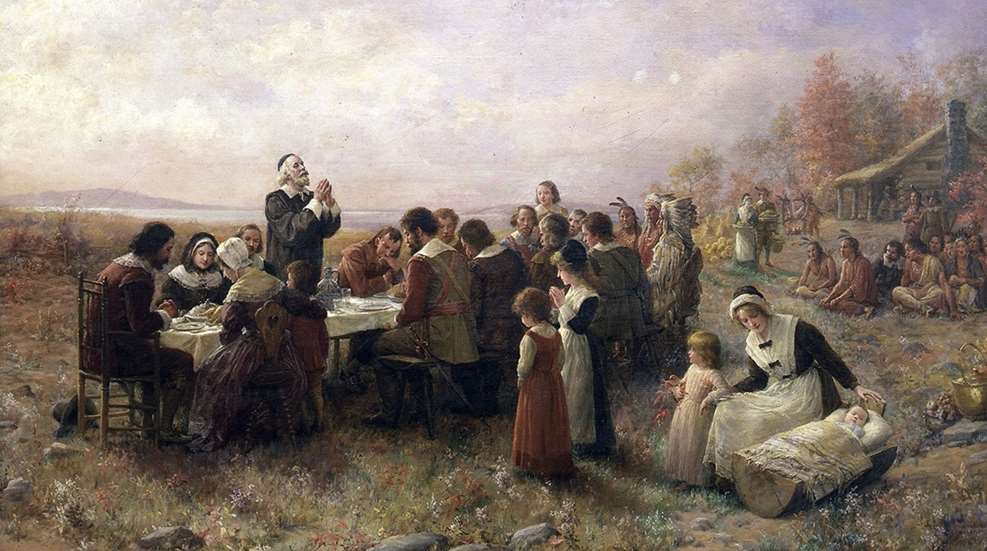The Women of the First Thanksgiving
Four Puritan women prepared the first “Autumn Harvest Feast,” now called Thanksgiving.
by HEIDI LYN RAO posted on November 23, 2023
Support NRA Women DONATE

The Women of the First Thanksgiving – NRA Women.com
The Puritans who colonized the Plymouth, Massachusetts area celebrated the first Thanksgiving in 1621. The first celebration was known as the Autumn Harvest Feast. It wasn’t until October 31, 1939, that President Franklin D. Roosevelt officially declared Thanksgiving to be the second to the last Thursday in November. Through Presidential Proclamation, he made Thanksgiving a national holiday. In a tradition that extended back to the original celebration, it is a time when family and friends get together to give thanks for all the blessings in their lives.
Everything we know about the first Thanksgiving comes from two sources. The most valuable source of the account was a letter written by Edward Winslow, a month later in December 1621. The second account was by William Bradford, the governor of the original colony. His account is less accurate because it was written 20 years after the fact, in a brief mention in his account titled “Of Plymouth Plantation.” Both men were part of the 100 pilgrims that left for the New World in 1620.
The first Thanksgiving in 1621 was attended by a little more than 170 people. The Puritans numbered approximately 55 individuals and the rest were made up of the local native American Indian tribe, the Wampanoag. Of the colonists, 22 were adult men, four were married women, and the rest were made up of children and teenagers. The women were far outnumbered because approximately 78 percent of them died from the harsh winters and disease. It was these four married women who prepared the meal to make the first “Autumn Harvest Feast,” now called Thanksgiving, possible.
These Puritan women were Susanna Winslow, Mary Brewster, Elizabeth Hopkins and Eleanor Billington. It was these four women who made the first Thanksgiving a celebration so memorable and historic that we still commemorate it over 400 years later.
Susanna Winslow
Susanna Winslow had the title of Goodwife. A Goodwife is the head of the household that holds the status of equal partner to her husband. Goodwife Winslow was 29 years old when she married Edward Winslow and participated in the cooking of the Autumn Harvest Feast. This was her second marriage.
Winslow’s first husband, William White, died during the first winter in February 1621. They had two sons together, Resolve and Peregrine. Edward Winslow’s first wife Elizabeth had a daughter named Margaret. Elizabeth Winslow died in March of 1621. Susanne married Edward Winslow five months later, two months before the Autumn Harvest Feast.
Mary Brewster
Mary Brewster was 52 years old and held the title of Saint. This title was bestowed on her because she was married to the spiritual leader, William Brewster. Mary and William Brewster had four children. Two daughters, Patience and Fear, which were left behind in England because they did not think that they would survive the journey to the New World. They also had two sons, Love and Wrestling, who were present at the first Autumn Harvest Feast.
Patience and Fear arrived at the colony a few years later. Once in the New World, Fear married another Saint, Isaac Allerton. Fear’s great-great-great-grandson Zachery Taylor became the 12th President of the United States.
Elizabeth Hopkins
Elizabeth Hopkins held the title of Traveler. This is because she was married to the very colorful traveler and explorer, Stephen Hopkins. Stephen Hopkins had traveled throughout the Caribbean and understood many dialects of the native populations. He had also taken part in the settlement of Jamestown.
Elizabeth was pregnant before setting voyage for the New World. She had hoped to give birth in the new land. Unfortunately, strong crosswinds and storms delayed the trip and the Mayflower landed later than expected. As a result, Oceanus was born beneath the deck in the dark, damp, and cramped hull of the ship.
Elizabeth and Stephen Hopkins were not particularly religious individuals like the rest of the Puritans. They had five more children and ran a tavern. They often got in trouble with the law and had to pay fines for serving alcohol on Sundays and overserving customers.
Eleanor Billington
Eleanor Billington had the title of Troublemaker. This is because her family were known as troublemakers. She had a very hard time controlling her husband John and two sons, John and Francis. Francis almost burned down the Mayflower as it sat in the harbor at Plymouth. John would go to another settlement called Nausets and make trouble with the new colonists upon their arrival.
The Governor, William Bradford referred to John Billington, Elanor’s husband, as a knave (a pheasant). The governor described the Billington family as the most “profane” of all the families. He would also often clash with Capt. Myles Standish, the leader of the colony’s militia. In 1630, John Billington was hanged for murdering a neighbor.
Eleanor Billington was herself a “troublemaker.” In 1636 she was sent to the stocks and was administered lashings for slandering another colonist, John Doane. Even though the Billingtons were known as troublemakers, they were invited to the first Autumn Harvest Feast and Eleanor helped prepare the meal.
Teenage Girls
There were five teenage girls who helped the four women prepare the first Thanksgiving meal, or the Autumn Harvest Feast. These girls were Pricilla Mullins, Dorothy (maidservant with no last name), Elizabeth Tilley, Mary Chilton, and Constance Hopkins.
Pricilla Mullins was 19 years old and lost both her parents during the winter. She soon married John Alden after the first Autumn Harvest Feast. Mary Chilton, 14 years old, was known as the first woman to set foot on Plymouth soil when she disembarked from the Mayflower. The other three helpers were Dorothy, a 19-year-old maidservant, Elizabeth Tilley, 14 years old, and Constance Hopkins, 13 years old.
We are thankful for the women of the past who shaped our family traditions today!
